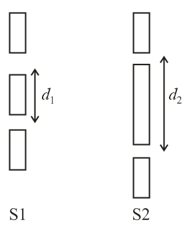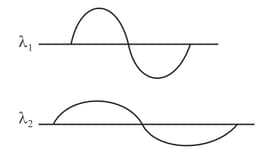Interference of Light Waves and Young's Experiment
Interference of Light Waves and Young's Experiment: Overview
This Topic covers sub-topics such as Young's Double Slit Experiment, Angular Fringe Width, Interference of Light Waves, Fringe Width in YDSE, Path Difference in YDSE, Intensity of Interference Pattern, Importance of Slit Width in YDSE and, Results of YDSE
Important Questions on Interference of Light Waves and Young's Experiment
The wavelength of light used in a bi-prism experiment is and is the intensity of central maximum. If the distance between two slits is and the distance of the screen from slits is then at what distance (in ) from the central maxima, the intensity will be ?
Determine the value of at which the intensity of the fringe reduced to half the intensity of the central maxima formed at point O.
Given two sets of slits S1 and S2.

Also, given are two possible incident light wavelengths and .

State with reason for what combination of the slits and wavelengths will the interference pattern be:
i. most spread out
ii. least spread out?
The interference pattern due to light shows bright and dark regions that appear similar to the antinodes and nodes of a standing-wave pattern on a string. While both the patterns are based on the superposition principle, give one major point of difference between the standing waves pattern and the interference pattern.
Under ideal conditions, consider two different sources of light producing identical waves that happen to be in phase with each other. The two sources are placed at the corners of a square. They broadcast waves uniformly in all directions.
Which of the following locations of the two sources will ensure that the waves always produce constructive interference at the centre of the square?
Two statements are given-one labelled Assertion (A) and the other labelled Reason (R). Select the correct answer to these questions from the codes (A), (B), (C), and (D) as given below.
Assertion (A): Interference pattern has all maxima that are equally bright and bands are large in number in comparison to the diffraction pattern that has maxima of decreasing intensity and fewer in number.
Reason (R): Interference is the result of the superposition of the waves from two different wavefronts whereas diffraction is the result of the superposition of the wavelets from different points of the same wavefront.
What if the monochromatic light is replaced with electron beam in YDSE experiment?
In double slit experiment, the separation between the slits is , the wavelength of light used is and the distance of the screen from the slits is . How many bright fringes are formed in one centimetre width, on the screen?
Why does the colour of films on the surface of water continuously change?
Draw the intensity distribution as function of phase angle when diffraction of light takes place through coherently illuminated single slit.
" If the slits in Young's double experiment are identical, then intensity at any point on the screen may vary between zero and four times to the intensity due to single slit".
Justify the above statement through a relevant mathematical expression.
What is the importance of slits in Youngs double slit experiment?
In young's double slit experiment what will happen if monochromatic light is replaced by white light.
A laser beam is _____ light.
In YDSE using monochromatic light of wavelength the intensity of light at a point on screen is .
What is the intensity of light at a point where path difference is .
A Young's double-slit experiment is performed with bi-chromatic light ( and ) for and . The distance of the first complete maxima from the central maxima on the screen is . The value of correct to one decimal is,
In Young's double slit experiment, the slits are apart and are illuminated by photons of two wavelengths . At what minimum distance from the common central bright fringe on the screen from the slit will a bright fringe from one interference pattern coincide with a bright fringe from the other?
Does diffraction take place at the Young's double slit?
Two waves of equal amplitude and frequency interefere at a particular point. Calculate the ratio of intensities when both the waves reach in phase and when they reach with a phase difference.
Ratio of intensities of two waves are given by . Then the ratio of the amplitudes of the two waves is
